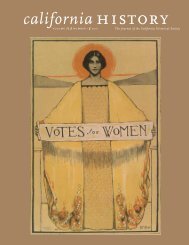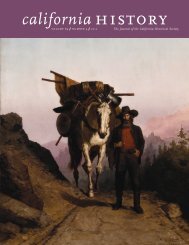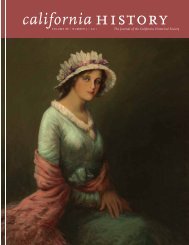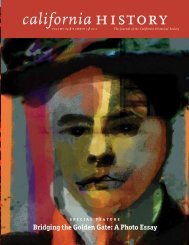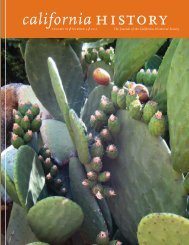Volume 90, Number 1 - California Historical Society
Volume 90, Number 1 - California Historical Society
Volume 90, Number 1 - California Historical Society
Create successful ePaper yourself
Turn your PDF publications into a flip-book with our unique Google optimized e-Paper software.
14<br />
In the summer of 1847, the surveyor and draftsman William Rich Hutton illustrated this section of the<br />
Santa Barbara mission’s water works. Along with agriculture, the Franciscans taught the Chumash irrigation.<br />
They constructed a dam in Pedregoso Creek, high above the mission, and diverted water to the<br />
mission via aqueducts. Some of the water system’s ruins are visible today.<br />
Courtesy of the Huntington Library, San Marino, <strong>California</strong><br />
Hispanic <strong>California</strong> and saw little to admire in<br />
the spiritual conquest of the padres, dismissed by<br />
some critics as slave drivers. 15 Were the missions<br />
good or evil? This question, which remains with<br />
us today, was hotly argued long before the American<br />
takeover of <strong>California</strong>. That event, in turn,<br />
contributed to a larger historical debate about the<br />
virtue of conquest in general, whether intended<br />
to assimilate Indians and save their souls or to<br />
further democracy and extend what Jefferson<br />
called an empire for liberty across the continent.<br />
The fact that American expansionists saw it as<br />
their manifest destiny to seize <strong>California</strong> from<br />
the descendants of Spanish colonists—who had<br />
regarded their own conquest as pious and providential—raised<br />
doubts about such competing<br />
<strong>California</strong> History • volume <strong>90</strong> number 1 2012<br />
claims. Skeptics wondered why God would favor<br />
one imperial venture over another, or bless either<br />
party with success when neither had motives as<br />
pure as they professed. What Josiah Royce said<br />
of his own assertive countrymen in the insightful<br />
history of <strong>California</strong> he composed in the late<br />
1800s could be said as well of earlier Spanish<br />
colonizers: “The American wants to persuade not<br />
only the world but himself that he is doing God<br />
service in a peaceable spirit, even when he violently<br />
takes what he has determined to get.” 16<br />
For Alfred Sully, praising the missionaries was a<br />
way of paying tribute to Manuela and the world<br />
that nurtured her. He did not stop to consider<br />
that the good done by the padres might be linked



